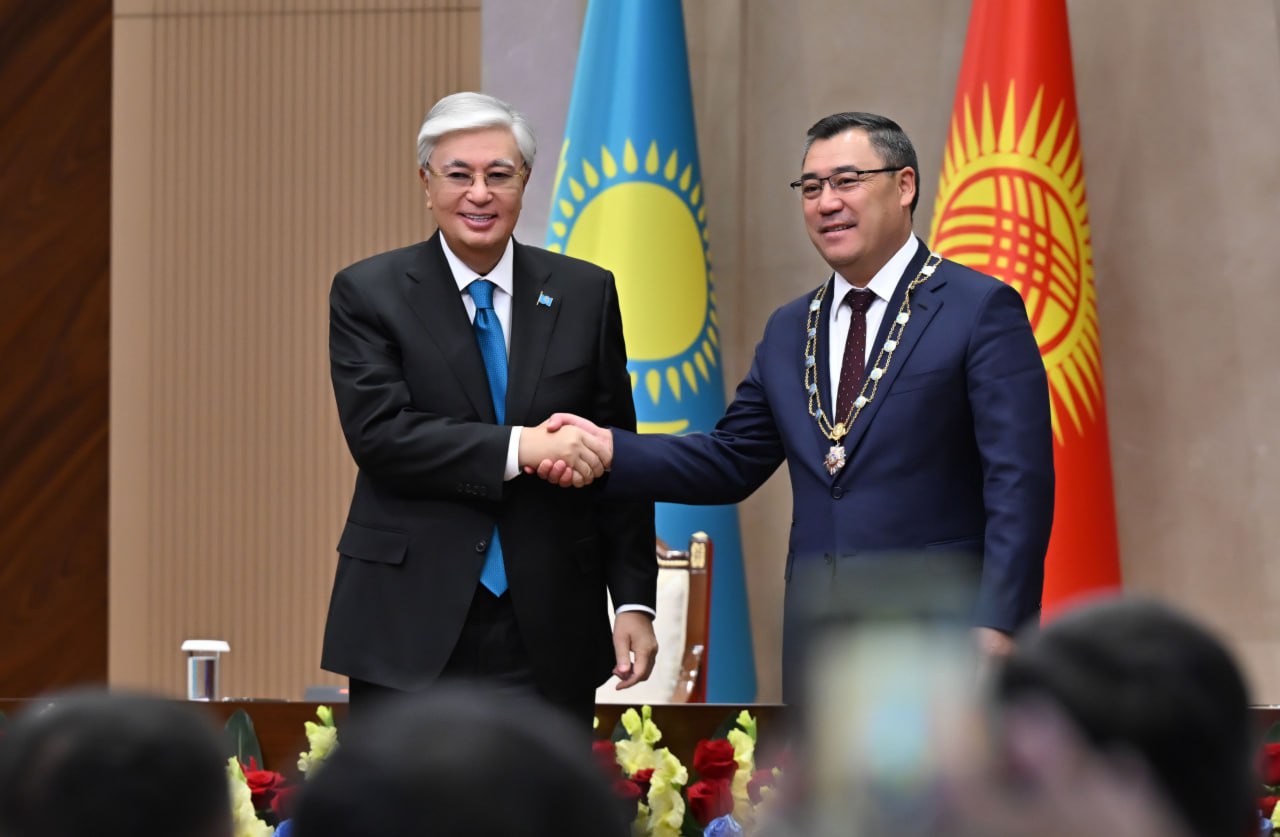BAKU, Azerbaijan, August 23. The visit of Kazakhstan’s President Kassym-Jomart Tokayev to Kyrgyzstan on August 21-22 marked a significant milestone in the bilateral relations between the two countries. During his trip, Tokayev held talks with Kyrgyz President Sadyr Zhaparov. The presidents also participated in the seventh session of the Supreme Interstate Council of Kazakhstan and Kyrgyzstan.
The most notable outcome of the visit was the signing of a Roadmap aimed at increasing bilateral trade turnover to $3 billion by 2030. The presidents also approved a Comprehensive Cooperation Plan for 2025–2027. These measures demonstrate the countries’ commitment to developing their partnership in a systematic and long-term manner.
Currently, trade ties between Kyrgyzstan and Kazakhstan are steadily growing. In 2024, bilateral trade reached $1.47 billion, a 7.4 percent increase over 2023. In the first half of 2025, trade turnover amounted to $721 million, up 13.8 percent year-on-year. Imports from Kazakhstan rose by 25.7 percent to $542 million, while Kyrgyz exports fell by 11.6 percent to $179 million. Despite this imbalance, Kazakhstan remains Kyrgyzstan’s third-largest trading partner after China and Russia, accounting for over 10 percent of the country’s total trade.
Following his meeting with Zhaparov, Tokayev noted at a press conference that about a quarter of total trade between the countries is concentrated in the agro-industrial sector. Development in this area is particularly important, as it not only boosts trade volumes but also supports local producers.
Expanding cooperation and creating joint ventures in agriculture will accelerate supply chains, improve production efficiency, and stimulate agribusiness development in both countries.
Challenges remain, particularly at the border, where queues, especially for freight, highlight the need to streamline customs procedures. The presidents discussed this issue and outlined specific steps to address it.
Special attention was given to increasing the capacity of the Kazakh-Kyrgyz border and optimizing freight transport. Tokayev noted that a series of large-scale initiatives have been implemented recently, and eight border checkpoints are currently being modernized. Completion is expected within the next two years, under strict oversight from both countries.
An important step toward achieving the $3 billion trade goal will be the launch of an industrial-trade-logistics complex at the border, scheduled for next year, as announced by the Kazakh president. The project is expected to facilitate cargo movement, reduce delays at checkpoints, and create better conditions for businesses, especially SMEs, thereby accelerating trade and attracting additional investment to border regions.
Improved border infrastructure will shorten delivery times, reduce business costs, and enable more active trade. All these measures contribute to closer economic integration between Kazakhstan and Kyrgyzstan and enhance the overall potential for cooperation.
The presidents also agreed to strengthen collaboration in the digital sphere and e-government, as well as to share experiences in the digital economy. This will help optimize government operations, accelerate business processes, and integrate companies at a cross-border level.
Coordination in the water and energy sector was another key topic. Efficient management of transboundary water resources is seen as vital for regional stability and sustainable development.
A particularly significant project is the Kambarata-1 hydroelectric power plant on the Naryn river, a construction agreement for which was signed by Kazakhstan, Kyrgyzstan, and Uzbekistan. With a capacity of 1,860 MW and a cost of $3.5 billion, it will generate 5.6 billion kWh of electricity annually. For Kazakhstan, the plant is especially important for providing irrigation water during the summer.
Meanwhile, in February 2025, Kazakhstan and Kyrgyzstan signed a roadmap for the construction of small hydroelectric plants on Kyrgyz territory.
These projects not only expand energy infrastructure but also drive regional development, creating jobs and strengthening the economic resilience of border areas.
The presidents also exchanged views on the international agenda. Tokayev noted that Kazakhstan and Kyrgyzstan share similar positions on many global issues and actively cooperate within the UN and other international organizations. He affirmed Kazakhstan’s support for Kyrgyzstan’s candidacy for a non-permanent seat on the UN Security Council for 2027–2028 and praised its work within the Collective Security Treaty Organization (CSTO) and the Organization of Turkic States (OTS).
Overall, the meetings resulted in the signing of 15 documents across the economy, transport, energy, digitalization, and cultural sectors. These include agreements on the use of navigational seals, modernization of checkpoints, radio frequency coordination, and training for border service personnel. Humanitarian cooperation was also emphasized, with agreements on culture, tourism, education, and media.
President Tokayev’s visit to Bishkek demonstrated that Kazakhstan-Kyrgyzstan relations have reached a new level. Cooperation is now more comprehensive, encompassing the economy, energy, infrastructure, digital transformation, and humanitarian spheres. The agreements signed lay a solid foundation for a long-term partnership based on mutual benefit and trust.
Considering current trends and agreements, the goal of raising bilateral trade to $3 billion by 2030 appears achievable. Large-scale energy and infrastructure projects are poised to strengthen ties and give new momentum to regional development. With effective implementation, Kazakhstan and Kyrgyzstan can significantly expand trade and investment while solidifying their strategic partnership in Central Asia.







